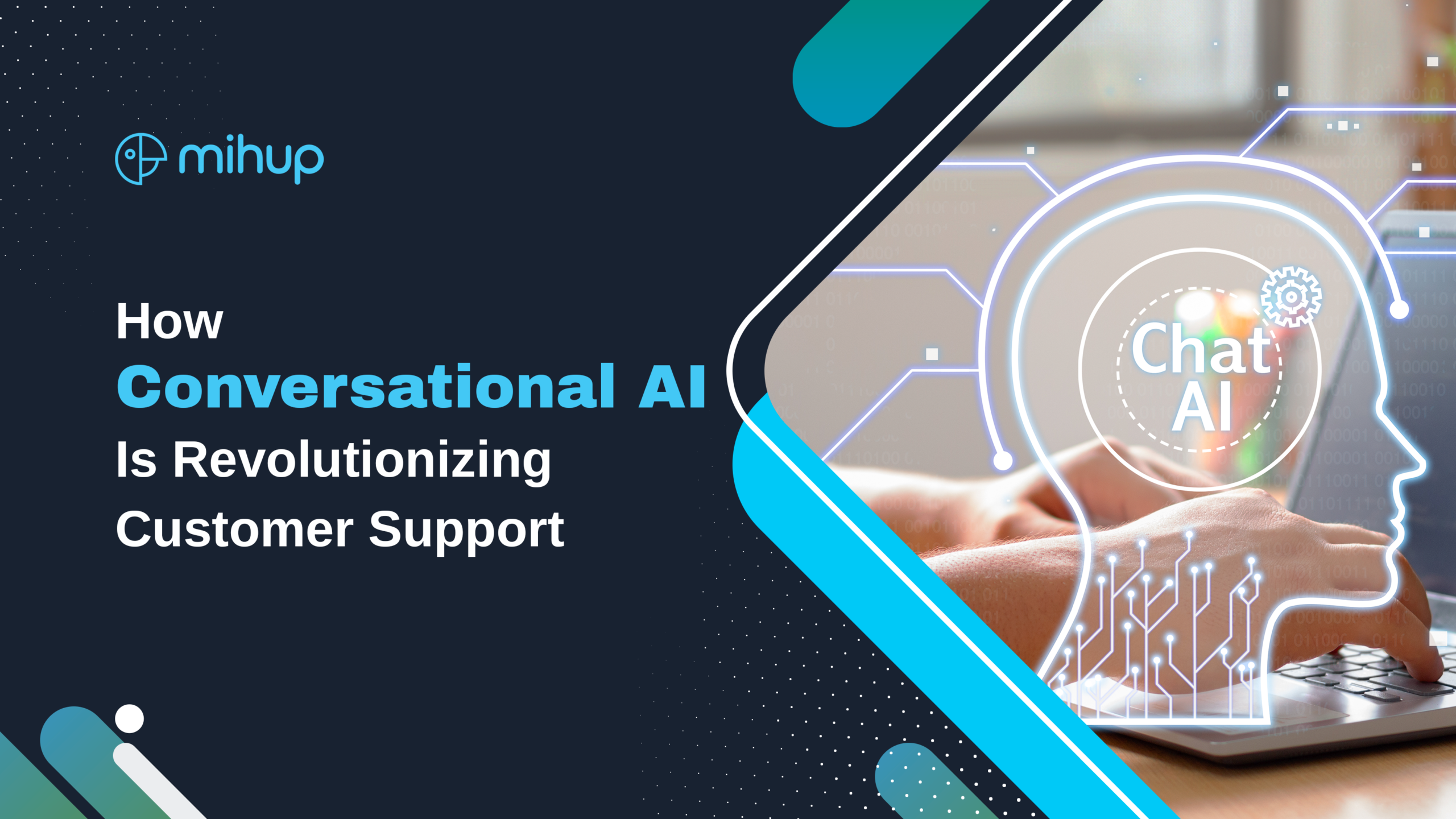Customer support is a critical aspect of any business. It’s the front line where companies interact with their customers, address their concerns, and build long-lasting relationships. Traditionally, customer support has relied heavily on human agents to handle inquiries and resolve issues. However, with the rapid advancements in technology, a new player has emerged in the customer support landscape – Conversational AI. Let’s explore how Conversational AI is revolutionizing customer support, making it more efficient, cost-effective, and customer-centric.
The Rise of Conversational AI
In the realm of customer support, technology is rapidly evolving, and one of the most groundbreaking advancements is speech analytics. Unlike traditional chatbots, which primarily rely on text-based interactions, speech analytics focuses on extracting invaluable insights from spoken interactions between customers and support agents.
Understanding the Power of Speech Analytics
Speech analytics leverages sophisticated algorithms to analyze and interpret spoken conversations. By tapping into natural language processing (NLP) and machine learning, it can uncover valuable information from audio recordings, transforming the way businesses approach customer support.
Know more about Speech Analytics in our blog – The Past and Present of Speech Analytics
While Conversational AI, in the form of chatbots, has made significant strides in customer support, speech analytics represents a parallel revolution. By harnessing the power of spoken interactions, businesses can tap into a wealth of insights, optimize their support operations, and provide unparalleled customer experiences. As technology continues to advance, speech analytics will play an increasingly pivotal role in shaping the future of customer support, enabling companies to stay attuned to customer preferences and ever-evolving market dynamics.
10 Ways Conversational AI is changing Customer Support
1. Availability 24/7
One of the most significant advantages of Conversational AI in customer support is its ability to provide round-the-clock assistance. Unlike human agents who work in shifts and need breaks, chatbots are always available to assist customers. This 24/7 availability is a game-changer for businesses, as it allows them to cater to customers in different time zones and address urgent issues promptly.
Imagine a scenario where a customer encounters a problem with a product or service late at night. With traditional customer support, they would have to wait until the next business day to get help. However, with Conversational AI, the customer can receive immediate assistance, improving their overall experience and satisfaction.
2. Cost-Effective Customer Support
Hiring and training human customer support agents can be a significant cost for businesses. Additionally, the cost per interaction with a human agent is typically higher than that of a chatbot. Conversational AI offers a cost-effective alternative by automating routine tasks and handling a large volume of inquiries without the need for additional human resources.
While chatbots are excellent at handling routine inquiries and providing quick answers, they can also escalate complex issues to human agents when necessary. This hybrid approach allows businesses to optimize their resources and allocate human agents to handle more intricate customer problems, further reducing costs and improving efficiency.
3. Consistency and Accuracy
Human agents are susceptible to human error, and the quality of customer support can vary from one agent to another. Conversational AI, on the other hand, provides consistent and accurate responses every time. It follows predefined scripts and guidelines, ensuring that customers receive the same level of service regardless of when or how they contact the company.
This consistency is crucial for building trust with customers. When customers know they can rely on consistent support, they are more likely to have a positive perception of the company and its products or services.
4. Scalability
As businesses grow, so does the demand for customer support. Scaling up a traditional customer support team can be a complex and time-consuming process. Hiring, training, and onboarding new agents takes time and resources. Conversational AI offers a scalable solution that can easily accommodate increased customer inquiries without the need for extensive hiring and training efforts.
Businesses can quickly deploy chatbots to handle the increased workload during peak seasons or when launching new products or services. This scalability ensures that customers continue to receive timely support even during periods of high demand.
5. Personalization and Customer Engagement
Conversational AI has come a long way in terms of personalization. Modern chatbots can analyze user data and preferences to tailor their responses and recommendations. By leveraging customer data, chatbots can provide personalized product suggestions, address customers by their names, and even remember previous interactions.
This level of personalization enhances the overall customer experience and makes customers feel valued and understood. It also helps in building stronger customer relationships, which can lead to increased loyalty and repeat business.
6. Multilingual Support
In today’s globalized world, businesses often serve customers from diverse linguistic backgrounds. Providing support in multiple languages can be a logistical challenge for traditional customer support teams. Conversational AI, however, can easily handle multilingual support by using language detection and translation capabilities.
This feature is particularly beneficial for businesses that operate internationally or have a customer base that speaks different languages. It allows them to cater to a broader audience and expand their reach without the need for hiring language-specific support agents.
7. Data Collection and Insights
Conversational AI not only assists customers but also collects valuable data and insights. By analyzing the interactions between chatbots and customers, businesses can gain a better understanding of customer preferences, pain points, and frequently asked questions.
This data-driven approach enables companies to make informed decisions and improvements in their products, services, and customer support processes. It also helps in identifying trends and issues early, allowing for proactive problem-solving.
8. Integration with Other Systems
Conversational AI can seamlessly integrate with other systems and databases, making it a powerful tool for customer support. For example, it can access customer account information, order history, and inventory levels to provide relevant and up-to-date information to customers.
This integration streamlines the support process and reduces the need for customers to switch between multiple channels or wait for manual lookups. It leads to faster issue resolution and a smoother customer experience.
9. Continuous Learning and Improvement
Conversational AI systems are not static; they continuously learn and improve over time. Machine learning algorithms allow chatbots to adapt to changing customer needs and preferences. They can learn from customer interactions and user feedback to enhance their conversational abilities and accuracy.
Businesses can also fine-tune chatbots based on the insights gathered from customer interactions. This iterative improvement process ensures that the chatbots become more effective and efficient at addressing customer inquiries and solving problems.
10. Human-Agent Collaboration
While Conversational AI offers many benefits, it’s important to recognize that there are limitations to what chatbots can do. Complex and highly emotional issues may still require the human touch. That’s why many businesses are adopting a model of human-agent collaboration, where chatbots handle routine inquiries and escalate more complex problems to human agents.
This approach combines the efficiency of AI with the empathy and problem-solving skills of human agents, providing a well-rounded and comprehensive customer support experience.
The Future of Customer Support
As technology advances, Conversational AI is set to revolutionize customer support further. With ongoing developments in Natural Language Processing (NLP), AI chatbots will become increasingly human-like, adept at understanding and responding to complex inquiries with a touch of empathy.
The integration of AI-powered voice assistants and chatbots into smart devices and the Internet of Things (IoT) ecosystem will elevate customer support to new heights. Customers will enjoy a seamless, convenient experience, as they can effortlessly seek assistance through voice commands and engage in natural conversations with AI-driven support systems.
In this evolving landscape, speech analytics is a key player. It goes beyond text-based interactions, providing deep customer insights, quality assurance, compliance monitoring, real-time feedback, agent training, enhanced personalization, and predictive analytics. As technology continues to progress, the synergy between Conversational AI and speech analytics promises to shape the future of customer support, offering unparalleled service quality and customer satisfaction.
By harnessing the potential of Conversational AI, companies can provide exceptional customer experiences, build customer loyalty, and stay competitive in today’s fast-paced business landscape. As technology continues to evolve, the future of customer support will undoubtedly be shaped by the continued advancements in Conversational AI.





